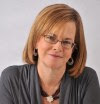Today, I am proud to report that the landscape at U.S. seminaries, divinity and rabbinical schools is shifting towards increased sexuality education. The Religious Institute announced this morning that twenty seminaries now meet a majority of the criteria for a sexually healthy and responsible seminary, or twice what we found in 2009 in our original "Sex and the Seminary" report.
During the past three years, the Religious Institute has partnered with these seminaries to ensure that tomorrow’s clergy are prepared to minister to their congregants, and to be effective advocates for sexual health and justice. These twenty seminaries now provide coursework on sexuality, policies that support sexual health, a commitment to an environment safe from harassment and abuse, and leadership that is committed to activism on sexuality issues. We have designated these twenty institutions as
Sexually Healthy and Responsible Seminaries.
The twenty seminaries represent 9 denominational schools and several inter/nondenominational schools in 12 states.
Some of the improvements in the past two years include the following:
•
Brite Divinity School, a Disciples of Christ seminary in Fort Worth, Texas now offers a full-semester course on sexuality and pastoral care issues; has revised their community inclusion statement to be inclusive of sex, gender identity, and orientation; and requires all field education supervisors, students, and lay committees to address sexuality-related training needs. Additionally,
Brite has developed a model for seminary-wide conversations on lesbian, gay, bisexual and transgender (LGBT) ordination within Christian denominations.
• The Jewish Theological Seminary developed two full-semester courses on sexuality issues, and now requires at least one full-semester sexuality-related course as well as clergy sexual misconduct training for all rabbinical students prior to graduation. Going forward, almost all Conservative rabbis in the U.S. will have at least one full course on sexuality issues, including education on sexual orientation and gender identity, as well as professional sexual misconduct training—all as a direct result of this project.
• Union Theological Seminary dedicated its alumni days to “Sex and the Church,” instituted a required sexual misconduct class, and greatly increased its curricular offerings on sexuality issues.
• Yale Divinity School now requires students take at least one of sexuality-related course prior to graduation. Yale also revised their Master’s of Divinity required ministerial misconduct workshop to include broader sexuality topics, including LGBT issues and sexual health.
These changes come at the same time that denominations have begun to require that their ministerial candidates demonstrate competencies in sexual health and sexuality education, and to take sexual misconduct prevention classes. The Unitarian
Universalist Association and the Metropolitan Community Churches now require all of their ministers to be prepared to address congregations’ sexuality issues. Other denominations, including The United Methodist Church, are currently preparing stronger requirements on sexual ethics and misconduct prevention.
These changes are occurring amid a backdrop of denomination struggles around the full inclusion of gay and lesbian persons and the increasing recognition that clergy sexual misconduct is far wider than just the Roman Catholic Church. Today’s clergy are faced with ever-complex sexuality issues, ranging from congregant online affairs to welcoming transgender people. The sexuality issues that clergy must sort out over the course of ministry
aren’t going to go away. As more sexually healthy and responsible clergy successfully meet these challenges, it is my heartfelt desire that we continue building on this progress, moving towards a time when all seminaries meet these criteria.

